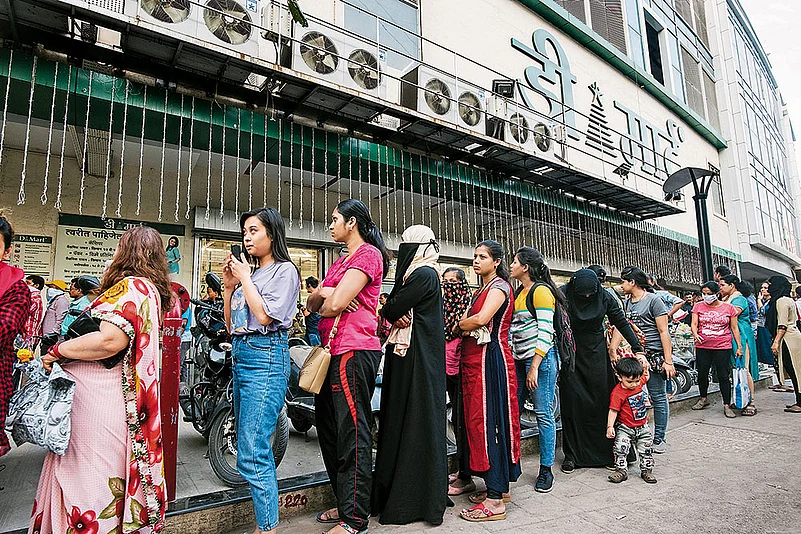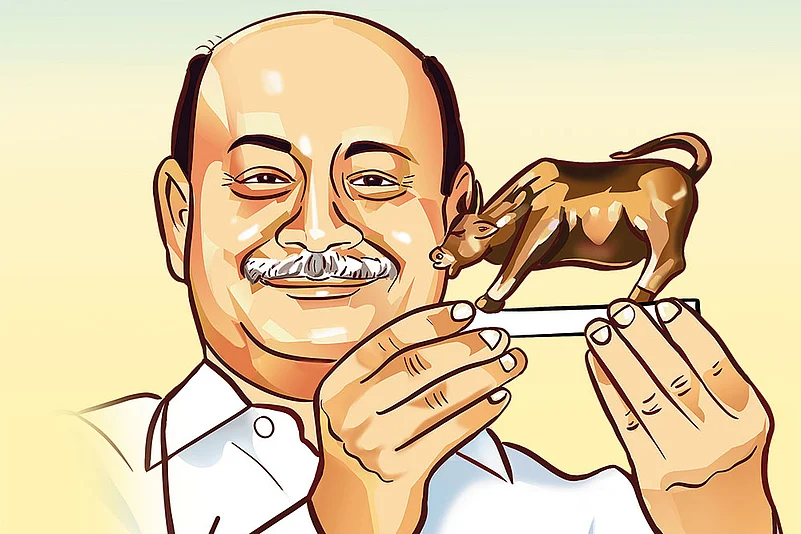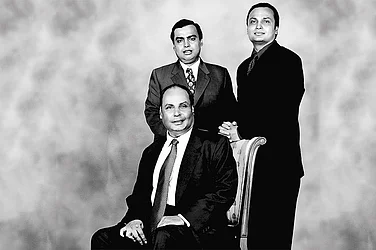Radhakishan Damani, founder of Avenue Supermarts, abides by the principle of letting one’s actions speak louder than words. With a $27.6 billion net worth, the media-shy entrepreneur is the third richest billionaire in India, as per Forbes, after Gautam Adani and Mukesh Ambani.
However, it is not just his wealth that has earned Damani cult status in the business world. Instead, his penchant for making strategic moves in the volatile retail sector has earned him the moniker “the retail king of India”.
Beating the Competition
When Damani launched the first DMart outlet in Mumbai in 2002, competition was already heating up in the organised retail trade. Kishore Biyani, founder and chief executive officer of Future Group, had launched his first Big Bazaar store almost a year earlier in Hyderabad.
A decade later, while Big Bazaar had set up 250 stores across India, DMart was operating a mere 10 outlets. These numbers may make one feel that the latter had ceded ground to its closest competitor. However, industry veterans knew that Damani was in for the long haul and was not interested in the short-term gain. Govind Shrikhande, former managing director of Shoppers Stop, considers Damani a long-term investor who looks at the retail race as a marathon rather than a sprint.
“He would get the business model right in one geography and keep expanding to nearby catchment areas before venturing to nearby cities in the same state and then progressively moving to the next state,” Shrikhande claims. “This logical approach helped the company build its supply chain and processing centres nearer to the markets while simultaneously cutting down on supply chain costs and time,” he adds. The company’s total store count pan-India stands at 284 currently, which includes DMart Ready and DMart Minimax outlets.
The focused tactic meant that the retail chain’s marketing costs were lower than the high-decibel advertising by other companies which were in a hurry to put more dots on their expansion map. According to another industry watcher, identifying the right catchment areas was an essential criterion for DMart when it zeroed in on a store’s location.
This analytical approach explains why it has closed very few stores in its two-decade-long journey while registering profits constantly. A Statista report claims that DMart’s revenue has grown tenfold since FY12, with revenue from operations in FY22 touching Rs 30,353 crore. This growth trend continues in Q2 FY23, when its net profit after tax stood at Rs 730.48 crore, up from Rs 564.03 crore in Q2 FY22.
Eye on the Retail Ball
Damani had a clear focus on his target clientele, based on the insight that he gleaned after taking the franchise for Apna Bazaar cooperative department store in 1997. He understood that fancy stores or celebrity brand ambassadors did not sway value-conscious buyers. They wanted good quality household products at affordable prices. Simply put, groceries sell faster than clothing, making them lucrative for cost-conscious customers.

Shrikhande believes that this intelligent customer segmentation worked in Damani and DMart’s favour. While his competitors juggled multiple customer segments with a product portfolio, he concentrated on grocery and general merchandise that met a household’s everyday needs.
“Damani also clearly communicated the brand’s unique selling point, which was offering products at 8% lower than the retail price. While the competition tried to play with multiple offers, discounts, big sale days, etc., no one dared to offer a promise of 8% lower price every day,” Shrikhande adds.
Owning Success
“Frugal” is an adjective that best sums up Damani, be it with his words, attire or business strategy. To make the premise of value retailing click, he decided that it was prudent to own the stores rather than use the traditional asset-light strategy of leasing them.
While most retail players typically opt for long-term leases, especially with malls, he decided to own the real estate for DMart’s standalone outlets. This is a capital-intensive model and one that many of his detractors scoffed at, but it paid off in the long run.
An industry expert explains why this strategy placed Damani leagues ahead of his competitors. “Since rentals in a mall often increase by around 5% annually, even for long-term leases, this cost, coupled with common-area maintenance, takes almost 7% of any retail business’ revenue. Owning the properties helped mitigate this expense and gave DMart a huge edge over the competition,” he elaborates.
In 2017, DMart’s holding company Avenue Supermarts had a spectacular debut on the Bombay Stock Exchange, with its shares getting listed at 102.14% premium. The retail chain was valued at Rs 39,400 crore then, more than the combined market capitalisation of its two competitors, Future Retail and Aditya Birla Fashion.
Flipping the Narrative
A common perception in the retail segment is that a company needs to operate on 20% to 24% margin to be profitable. This is also why most players expand their product portfolio to include fashion and general merchandise to gain better overall margins and market share.
Damani decided to look at things differently through the lens of cost management. Rather than having elaborate stores with fancy décor, he focused on productivity per square feet. By building DMart as a no-frills air-conditioned retail store, he could almost double sales productivity per square foot, in addition to 3x to 4x stock turns compared to his peers.
This quick inventory turnover, primarily propelled by discounted pricing, meant that the company’s holding cost was relatively lower. To ensure that it has fresh products that can keep pace with this inventory churn, DMart decided to have pro-supplier policies.
By paying vendors within 10 days of delivery, Damani achieved multiple goals. DMart emerged as a favourite trading partner for FMCG suppliers, and several even offered better pricing in lieu of quicker payment. Moreover, the steady product replenishment meant that the store’s shelves were always well-stocked, which improved customer retention.
While Damani’s reputation is synonymous with that of DMart, the astute businessperson has picked up stakes in several companies, harking back to his early days as a stockbroker, where he learned the merits of spreading the risks. Today, he has stakes in companies like United Breweries, Sundaram Finance, India Cements and Advani Hotels and Resorts.
Unwavering focus on his customers and suppliers to the exclusion of everything else is how Damani drowned out the white noise prevalent in the retail sector. His preoccupation with profitability with long-term goals has helped DMart become a brand to reckon with in an industry subject to constant headwinds.































